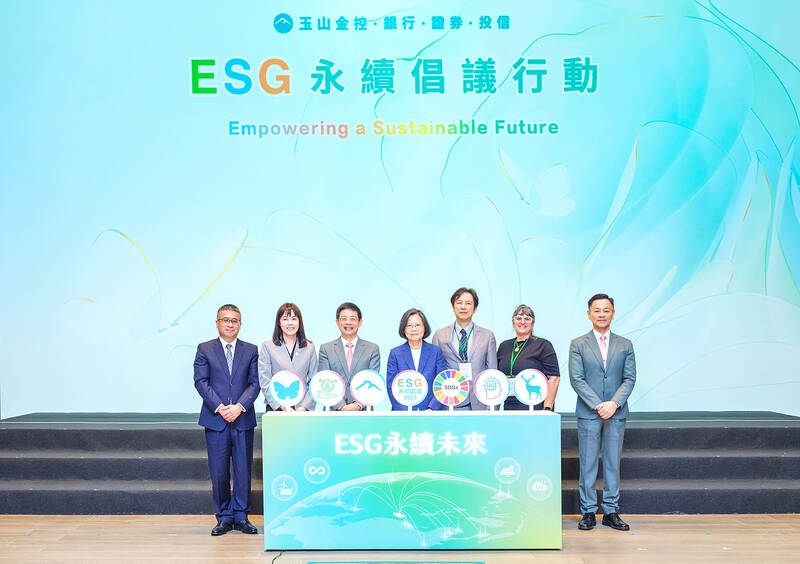E.SUN FHC on Tuesday held its “2025 E.SUN ESG Sustainability Initiative,” attended by former president Tsai Ing-wen (蔡英文), Financial Supervisory Commission Deputy Chairman Chen Yen-liang (陳彥良), and Banking Bureau Director-General Tung Cheng-chang (童政彰). Since 2021, E.SUN has advanced its sustainability efforts, from climate awareness and carbon reduction to building a platform to sustainable transformation. This year’s focus was on talent development and technological empowerment, with nearly 200 enterprises, medical institutions, and artificial intelligence (AI) organizations participating. International professors from the US, Japan, Australia, Singapore and ASEAN shared insights to foster environmental, social and corporate governance (ESG) talent and accelerate sustainability through technology.
Tsai, attending the event for the third time, praised E.SUN’s dedication to sustainability and inscribed a blessing amulet with the phrase “Light up Taiwan, Inspire the Future.” She highlighted that sustainable development is a shared but challenging goal, requiring courage, vision and action. She said she hopes all sectors will work together to advance Taiwan’s sustainability and build stronger international trust, a key asset for global engagement.
Robert Dornau, Head of Corporate Sustainability Engagement at S&P Global, emphasized that industries worldwide view talent development as one of the most crucial elements of sustainable development.

Photo courtesy of E.Sun FHC
Dornau highlighted that companies committed to sustainability demonstrate higher employee engagement and productivity.
E.SUN FHC Technology Advisory Committee member Li-Feng Chien delivered a keynote speech titled: “AI and ESG: Talent Empowerment and Net-Zero Transformation,” illustrating how generative AI can act as accelerators for corporate sustainability. The subsequent panel discussion featured Industrial Technology Research Institute President Edwin Liu (劉文雄), Ross P. Buckley of the University of New South Wales and Kanji Tanimoto of Waseda University. They engaged in a multifaceted discussion covering industry, finance, international governance and talent development, exploring how technology and talent can drive sustainable transformation.
E.SUN FHC chairman Huang Nan-jhou said: “Technology allows us to move faster, and talent enables us to go further. Only by combining the two can enterprises continue to innovate and move toward sustainability in a rapidly changing global market.”
E.SUN remains committed to achieving net zero by 2050 and strengthening Taiwan’s global competitiveness.

In Italy’s storied gold-making hubs, jewelers are reworking their designs to trim gold content as they race to blunt the effect of record prices and appeal to shoppers watching their budgets. Gold prices hit a record high on Thursday, surging near US$5,600 an ounce, more than double a year ago as geopolitical concerns and jitters over trade pushed investors toward the safe-haven asset. The rally is putting undue pressure on small artisans as they face mounting demands from customers, including international brands, to produce cheaper items, from signature pieces to wedding rings, according to interviews with four independent jewelers in Italy’s main

Japanese Prime Minister Sanae Takaichi has talked up the benefits of a weaker yen in a campaign speech, adopting a tone at odds with her finance ministry, which has refused to rule out any options to counter excessive foreign exchange volatility. Takaichi later softened her stance, saying she did not have a preference for the yen’s direction. “People say the weak yen is bad right now, but for export industries, it’s a major opportunity,” Takaichi said on Saturday at a rally for Liberal Democratic Party candidate Daishiro Yamagiwa in Kanagawa Prefecture ahead of a snap election on Sunday. “Whether it’s selling food or

CONCERNS: Tech companies investing in AI businesses that purchase their products have raised questions among investors that they are artificially propping up demand Nvidia Corp chief executive officer Jensen Huang (黃仁勳) on Saturday said that the company would be participating in OpenAI’s latest funding round, describing it as potentially “the largest investment we’ve ever made.” “We will invest a great deal of money,” Huang told reporters while visiting Taipei. “I believe in OpenAI. The work that they do is incredible. They’re one of the most consequential companies of our time.” Huang did not say exactly how much Nvidia might contribute, but described the investment as “huge.” “Let Sam announce how much he’s going to raise — it’s for him to decide,” Huang said, referring to OpenAI

The global server market is expected to grow 12.8 percent annually this year, with artificial intelligence (AI) servers projected to account for 16.5 percent, driven by continued investment in AI infrastructure by major cloud service providers (CSPs), market researcher TrendForce Corp (集邦科技) said yesterday. Global AI server shipments this year are expected to increase 28 percent year-on-year to more than 2.7 million units, driven by sustained demand from CSPs and government sovereign cloud projects, TrendForce analyst Frank Kung (龔明德) told the Taipei Times. Demand for GPU-based AI servers, including Nvidia Corp’s GB and Vera Rubin rack systems, is expected to remain high,